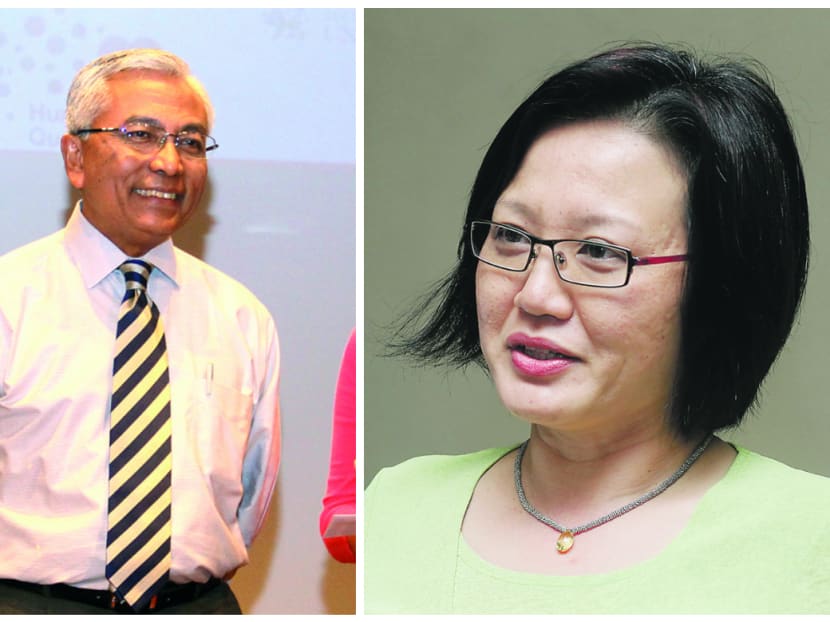WP ‘politicising’ renaming of ISEAS
SINGAPORE — Yesterday’s (July 14) parliamentary debate on a Bill to rename the Institute of Southeast Asian Studies (ISEAS) after the Republic’s first President took an acrimonious turn, after Senior Parliamentary Secretary (Education and Manpower) Hawazi Daipi accused Workers’ Party chairman Sylvia Lim of politicising the issue.
SINGAPORE — Yesterday’s (July 14) parliamentary debate on a Bill to rename the Institute of Southeast Asian Studies (ISEAS) after the Republic’s first President took an acrimonious turn, after Senior Parliamentary Secretary (Education and Manpower) Hawazi Daipi accused Workers’ Party chairman Sylvia Lim of politicising the issue.
Ms Lim had voiced her party’s objection to a clause that reduces the size of the board from 22 to 15 and gives a Minister, instead of the President and other organisations as per the current practice, sole powers to appoint board members.
Education Minister Heng Swee Keat, WP chief Low Thia Khiang and WP Member of Parliament Faisal Manap also jumped into the fray and locked horns for more than 30 minutes, prompting Parliament Speaker Halimah Yacob to stop the feisty debate, which she said was “going around in circles”. The exchange saw Mr Low accusing the Government of having a hidden motive to “control” ISEAS under the guise of honouring Mr Yusof. This drew a testy response from Mr Heng, who said he was “surprised” and “disappointed” by Mr Low’s comments.
The Bill was eventually passed, with the objection of all nine WP MPs against the clause, but not the Bill as a whole, put on record, at the insistence of Ms Lim. She had earlier said WP would vote against the Bill if the clause was not removed.
The ISEAS Act, passed in 1968, provided for board members to be appointed by the President and four chambers of commerce, two charitable organisations and the president of the National University of Singapore.
During the debate, Ms Lim said she supported the renaming of ISEAS to the ISEAS-Yusof Ishak Institute. However, more than the name change, the Bill sought to change the structure of the institute’s board “in a very fundamental way”. “It appears to be a regression from its original statutory structure that guarantees representation of a diversity of interests,” she said.
She added: “Can ISEAS maintain its autonomy and independence with all the powers concentrated in the minister with this Amendment Bill? More worryingly, is the concentration of powers to appoint the Board in the minister a sign of things to come? Are there plans to turn ISEAS into a body that simply churns out knowledge for the government bureaucracy?”
Mr Hawazi said he was “quite hurt” by Ms Lim’s remarks. “I feel that it is not the right time, while we are giving the highest honour to a pre-eminent Singaporean based on his contributions … We politicise this issue by questioning whether ISEAS will become a body that will follow instructions of the Government,” he added.
Mr Heng described the clause as an “update (of) provisions”. Adding that a board that is too big does not function effectively, Mr Heng, who questioned WP’s sincerity in supporting the Bill , also compared ISEAS with other statutory boards where, in general, board members are appointed by a minister as they “draw resources from the Government and it is important that there be proper accountability”.
Wading into the debate, Mr Low questioned whether the Government was sincere in honouring Mr Yusof or if it was a disguise to “controlling ISEAS by changing the appointment powers”. He drew reference to Nanyang University, which in 1980 was merged with the University of Singapore to form the National University of Singapore, amid strong opposition.
In response, Mr Heng, who repeatedly told WP not to “throw up a red herring”, said: “I spent so much time in my speech talking about why ISEAS has been an important institute in Singapore over the years and why it will continue to play a major role in the years forward. Do we want ISEAS to succeed? Absolutely! So why would I as a minister make an amendment to the change in order to make ISEAS less effective? I hope, Mr Low, that you do not start imagining things when there are none, and that is not good for governance.”
But Mr Low said the WP “cannot support the change that is being ‘tompang’ (piggyback in Malay) with the name change”. Mr Heng replied that it was not the Government’s plan to use the name change to tweak the board’s composition. During the voice vote, Ms Lim stood up more than once to ask Mdm Halimah to put on record WP MPs’ opposition to the clause.
This prompted Deputy Prime Minister Teo Chee Hean to clarify whether MPs could back a Bill while registering their opposition to specific clauses. Mdm Halimah said this was allowed under Parliament’s standing orders.







